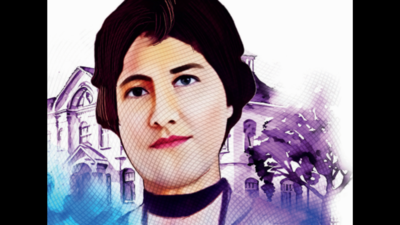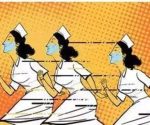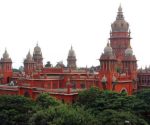Sarah Tucker: British teen who helped fund South India’s first women’s college | Chennai News – The Times of India

At 14, Sarah Tucker, a disabled girl from Wales, was so moved by rural girls in Tirunelveli forced into manual labour that she collected money to help start an educational institute for them.
It was the mid-1800s, and girls from rural communities in Tamil Nadu rarely attended formal school, let alone college. The only options for the few privileged men who wished to pursue higher studies were the Madras Presidency College and the Madras Christian College.
It was at such a time that a young disabled girl from Wales in England dared to dream of starting a women’s college in Palayamkottai village (today a town) in Tirunelveli and managed to achieve it, albeit posthumously.

Sarah Tucker College, the first college for women in South India, was established in 1895, at a time when the majority of girls in the country were illiterate. Yet, little is known about its history or the spirited woman behind its origin.
“All we have are a few notes from the college records, the local church, and Church Mission Society (CMS),” says Rajakumar Arulanandham, a research scholar from Palayamkottai, which over centuries has grown into a bustling town, home to several educational institutions, and known as the ‘Oxford of South India’.
Some records say Sarah was born lame, while others say she was blind and contracted polio as a child. But she could never travel to India, and over the years, her support for the cause was from England through correspondence and financial contributions.

“Sarah was born in 1825 to a wealthy and devout Christian family in Wales, which advocated education for their children, girls and boys. From the age of 14, she got involved in the cause of education for women,” says Rajakumar.
Sarah came to know about the condition of women in India through her brother, John Tucker, who was working with the Church Missionary Society (CMS) in Madras.
“He would write letters to his sister on the situation in Tamil Nadu, which moved her. Rural girls engaged in manual labour alongside their parents as a matter of course,” he says.
On the contrary, in England, it was an age when the educational system was undergoing reform, and women were being educated not just in England but across the British Empire. Meanwhile, Sarah learned from her friends working in the CMS base in Tirunelveli that a school for girls was the need of the hour.
Her writing skills were also impressive, and she was able to convince the public in England to contribute to the cause through her articles in newspapers and magazines.
“With the help of her friends, she collected 24 sovereigns (pounds) as a donation and sent it to John Tucker, and the Sarah Tucker School was established at Kadatchapuram near Mudhalur in 1843, with the amount.
“She sent books and educational materials for teacher training to the school as her aim was to not just provide basic education but an opportunity for girls to gain skills that would improve their social and economic standing,” says Rajakumar.
Most of the teachers during this time were British women, among whom were Sarah’s friends – Sophia and Kilburn. But there was a dire lack of teachers, as well as students, since few local families were open to the idea of sending their daughters to school. The school had to be closed within a few years, and the existing students were transferred to the training school for boys in Palayamkottai.
Sarah never married, and her brief life was completely focused on her dream. But before she could fulfil it, she passed away on December 18, 1857. However, it was just the beginning, as her friends didn’t give up on her dream.
“Three of them — Maria, Sophia, and Joanna — formed a committee to collect funds for a larger institution in Tirunelveli in Sarah’s name, and donations came pouring in,” says Rajakumar.
The 268 sovereigns and 17 shillings collected were handed over to Rev Edward Sargent by John Tucker, who bought a piece of land south of Palayamkottai, where the school was re-established in 1858, exactly a year after her death, with a teacher training institute for women on the same campus. Teachers who trained here would eventually travel to different parts of the country and start new schools or teach and train other women, creating a ripple effect.
In 1895, the high school was upgraded to a second-grade college affiliated with Madras University, with just four students, making it the first all-women’s college in South India.
The 1890s was a time when India was plagued by a famine, and it is indeed a feat that these women were able to raise money and start a college amid it all, says Manikumar Ayyamperumal, a historian.
“To provide context, it was a time when large-scale conversions to Christianity were taking place as the missionaries were involved in famine relief in a big way.” In fact, the village of Mudalur nearby is considered the first Christian village in Tamil Nadu.
Not much is known about who the first students were, but mathematics at the pre-university level, as well as degree courses, were introduced by the 1920s, which means the college soon became popular, says Thangam M S, associate professor at the college. “It was after independence that non-British principals started being appointed.”
In 1948, the college was shifted to a separate 40-acre campus, and there are no traces of the original buildings today. “The Sarah Tucker College and the training college produced generations of women teachers over a century, who can be found in every nook and corner of India,” says Rhoda Alex, a communication artist from Chennai. Rhoda’s grandmother’s family lived in Sri Lanka, as her grandfather was employed as a clerk in the tea estates there.
“My grandmother was brilliant in studies, but in the early 1900s, Madras was too far to travel to, and Sarah Tucker College provided an option for students like her, as well as for the next generation — my mother and her sisters.”
Over the years, other colleges too sprouted within kilometres of each other, and the area used to be called the Oxford of South India, says Rhoda. The arts and science college, which received autonomous status in 2007, continues to be a sought-after educational institution in Tirunelveli today, offering graduate and post-graduate courses with nearly 20 departments and a research centre.
A faded painting of Sarah Tucker hung on a wall in the college building is all that remains of the founder today, whose story none except a few historians and old teachers know about. In 2024, Tamil Nadu Assembly Speaker M Appavu appealed to Chief Minister M K Stalin to honour Sarah Tucker’s contributions with a memorial.
An accidental blind school
The story goes that Miss A J Askwith, a British teacher at the Sarah Tucker School, was approached by a blind boy who came begging for food. When he came to know that it was an educational institution, he also wanted to study there.
Noticing his ambition, Askwith returned to England, learned Braille, and later established a school for the blind on the same premises. With the help of another missionary, Florence Swainson, a school for the deaf and dumb was also established on the premises. These are functional even today.
Welcome to Tuckerammalpuram
The land which was bought with the donations collected by Sarah Tucker’s friends came to be called Tuckerammalpuram. A village panchayat today, mostly teachers and other staff of the institutions live in this suburb.
















